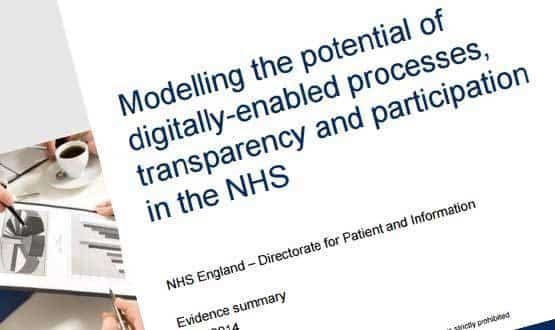IT productivity plan an ‘educated guess’
- 16 November 2015

NHS England’s plan to spend billions on technology to drive efficiencies in healthcare provision is based on an “educated guess”, according to an academic in health information.
Dr Philip Scott, a senior lecturer at the University of Portsmouth’s Centre for Healthcare Modelling and Informatics, told Digital Health News that the ‘evidence summary’ for the McKinsey report, which is driving NHS England’s digital health agenda, doesn’t provide any genuine evidence for its recommendations.
“One of the objectives says it is to provide an evidence base, but it’s not evidence at all, it’s an educated guess. There’s nothing wrong with educated guesswork but that’s what it should be called.”
The full McKinsey report is unavailable to the public, although an evidence summary was sent to Digital Health News by pressure group Spinwatch, which obtained it via a Freedom of Information Act request.
It recommends that the NHS needs to spend an additional £7.2 billion to £8.3 billion on digital technology over the next five years in order to achieve savings of between £8.3 billion and £13.7 billion.
The latter figures were discussed publicly by NHS England’s director of patients and information, Tim Kelsey, during a meeting of National Information Board earlier this year, while the investment recommendations appear to form the basis for NHS England’s bid of between £3.3 billion and £5.6 billion to the government’s spending review, which is due to report later this month.
Scott said that the suggestion that investment in technology could save up to £13.7 billion is “an unfounded claim”.
“It’s not based on anybody actually having done it; it’s based on what we think it ought to do. And, as we know from the National Programme [for IT] and other initiatives, there is often a gap between expectations and reality.”
He added that without being able to see the details in the full report it would be hard to say for definite, but that the potential savings pointed out by McKinsey across the different areas of healthcare have “the ring of being very optimistic estimates”.
The report also fails to make clear if it includes the business transformation costs of implementing new technology and if McKinsey has considered potential “downsides”, such as clinicians taking more time to complete certain tasks electronically.
“I still think it’s very naive to think you can implement EHRs and save billions of pounds. It’s just not that simple.”
Scott said there is still a strong case to invest in technology in healthcare, but that it should be based on the potential to provide safer care that is of a better quality rather than to save money.
“The spending review has to fund the substantial money that’s being asked for digital health investment, but it shouldn’t be doing it on this rationale, but on the rationale that we need to make the health service safer and better. Eventually that will make it cheaper but I don’t think in the timescales that are currently predicted.”
Scott has previously written in the Journal of Innovation in Health Informatics about the need to effectively evaluate the NIB’s Personalised Health and Care 2020, which provides a framework to go ‘paperless’ in healthcare by 2020.




